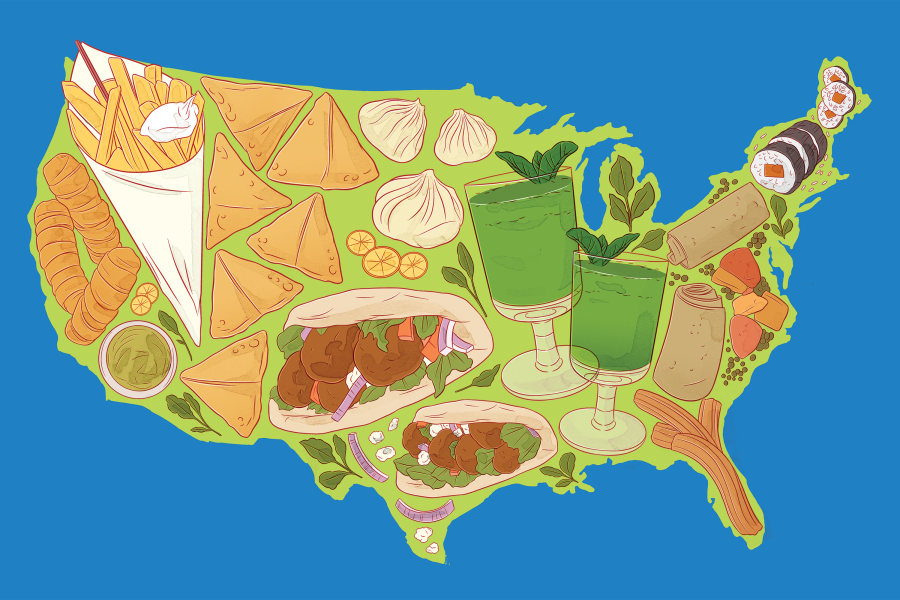We dragged two trunk-size suitcases down the middle of a completely desolate Pennsylvania Avenue. Inside the cases were 12 pounds of chicken thighs, 21 pounds of baby spinach, 17 onions, 16 heads of garlic, 25 pounds of carrots, and 9 pounds of celery, among other assorted vegetables, legumes, and proteins.
In this frigid weather, you could see plumes of vapor as we heaved the suitcases past the first checkpoint patrolled by National Guard troops. The D.C. police had closed the roads a few blocks farther east, and the last stop would be the Secret Service checkpoint, two blocks from the White House. As tiny beads of sweat formed, we looked at each other and smiled, each of us knowing exactly what the other was thinking: "Ah, the benefits of a SAIS degree put to work!"
We were dragging the suitcases down Pennsylvania Avenue because our restaurant, Immigrant Food, ran out of menu ingredients. None of our distributors would dare attempt to run the cordon sanitaire (can you detect our fluency in geopolitical lingo?) set up for Joe Biden's post-insurrection inauguration. We, however, were determined. Unlike most downtown restaurants, Immigrant Food was not going to close that day.
After all, Immigrant Food was created to defend the vision of America as an immigrant nation. We opened our doors in November 2019 because we believed that policymaking or nonprofits were not the only way to fight against America's newfound intolerance against immigrants. Call it gastroadvocacy.
Why insert a restaurant into the polarized and poisonous immigration debate? Think about it. The dinner table is where we have our most difficult, intimate, and vulnerable conversations. Our view is that it's much easier to debate thorny issues when you're at a table with a spread of Belgian fries, Indian samosas, Venezuelan tequeños, falafel bocadillo, and Middle Eastern mint limonana.
And so, over the past three-plus years, we've done more than serve amazing food. We have partnered with five immigrant service nonprofits, and we donate our restaurant space for their seminars or board meetings; we post a weekly "Engagement Menu" every Sunday in the restaurant and on social media that recommends five new ways our guests and community can engage with immigrants; and we publish a digital monthly news magazine called The Think Table, which seeks to fight misinformation and educate our readers about one specific slice of the multipronged immigration debate.
Don't believe politicians. Immigration is not as divisive as some would like us to believe. Americans still overwhelmingly believe immigration benefits our country. Three out of four Americans say they think immigration is a "good thing" for the U.S., according to a 2021 Gallup poll. After all, the story of America is intertwined with the stories of immigrants.
"America is open to receive not only the opulent and respectable stranger but the oppressed and persecuted of all nations and religions," George Washington told new Irish arrivals in 1783. Immigration reflects a deep faith in the American ideal. Funnily enough, most immigrants have a more positive—and perhaps more patriotic and inclusive—idea of what the United States is and ought to be than many of America's far-too-polarized citizens of the left or right.
Also see
We stand with immigrants because we're convinced that they are a transcendental cultural and economic force for good. Immigrants built many of the cutting-edge companies that transform our lives, employ thousands of U.S. workers, and make Americans proud. Did you know that 55% of America's billion dollar startups have an immigrant founder? The current CEOs of Microsoft, Google, Tesla, Uber, and Oracle were all born overseas. Steve Jobs, the founder of Apple, was the son of a Syrian immigrant. Amazon's Jeff Bezos was raised by an immigrant father from Cuba. Immigrants have constituted 40% of U.S. science Nobel Prize laureates since 2000, and they make up around 25% of all U.S. science and technology workers. In sports, immigrants are America's star athletes. In the NBA, about 20% of players were born outside the United States. In baseball, that number is close to 30%.
Immigration is a bedrock of this country's national strength. It will continue to be a key source of America's strength and its ability to continue as a hub of leadership, innovation, and entrepreneurship.
It's fun to espouse a cause where people least expect to find it. That's why the two of us served meals, delivered bowls, and bused tables throughout the pandemic. Along with lugging suitcases full of food down Pennsylvania Avenue, it's some of the hardest work we've ever done. But we're determined to continue giving this small business a big voice by fusing an innovative dining experience with a social justice vision.
Posted in Voices+Opinion
Tagged political science, foreign policy, food, immigration, politics, dining, public policy








